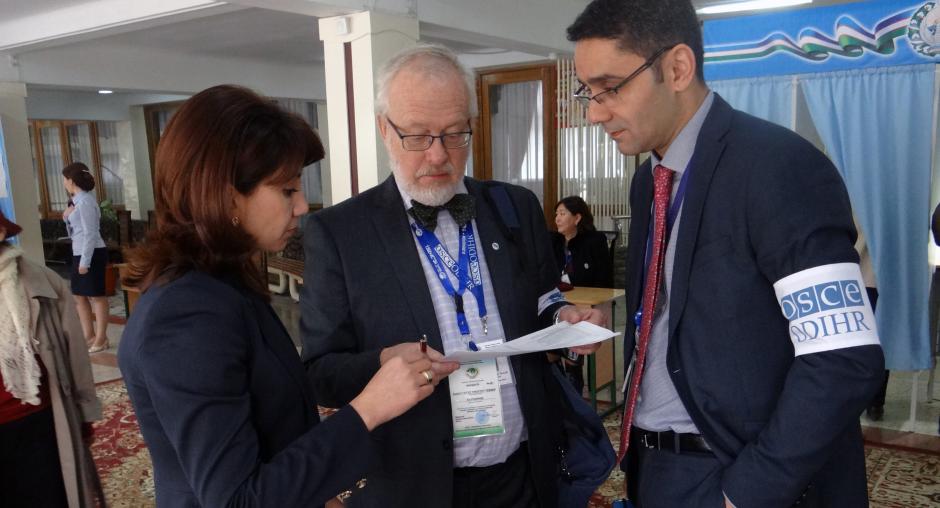Uzbekistan presidential election underscores need for comprehensive reforms, OSCE/ODIHR observers say

TASHKENT, 5 December 2016 – The 4 December presidential election in Uzbekistan underscored the need for comprehensive reforms to address long-standing procedural and systematic shortcomings, including to a legal framework that is not conducive to holding genuine democratic elections, the election observation mission from the OSCE Office for Democratic Institutions and Human Rights (ODIHR) concluded in a preliminary statement released today.
While the election administration took measures to enhance the transparency of its work and the proper conduct of the election, the dominant position of state actors and limits on fundamental freedoms undermine political pluralism and led to a campaign devoid of genuine competition, the statement says. Media covered the election in a highly restrictive and controlled environment, and the state-defined narrative did not provide voters the opportunity to hear alternative viewpoints, the observers said.
“The preparations for yesterday’s election were reasonably well-organized, and we observed some improvements of a technical nature, but there is still much more to do, and this is spelled out in our preliminary statement,” said Ambassador Peter Tejler, Head of the OSCE/ODIHR election observation mission. “Systemic shortcomings highlighted in previous ODIHR recommendations remain, and there are serious limitations on fundamental freedoms.”
The election is regulated by a multitude of laws and Central Election Commission (CEC) resolutions. Recent technical amendments addressed some previous ODIHR recommendations, but most other long-standing key recommendations remain unaddressed. Overall, the legal framework unduly limits fundamental freedoms of expression, association and assembly, and is restrictively implemented.
The observers noted that election commissions, led by the CEC, efficiently administered operational aspects in the pre-election period and met all legal deadlines. The CEC held open sessions and promptly published its decisions, thus contributing to the transparency of the process. Important procedures related to election day and the tabulation of results were left unregulated, and significant irregularities were noted on election day, including indications of ballot box stuffing and widespread proxy voting, despite a concerted campaign to address the latter.
“In our meetings with the Uzbekistan authorities we have sensed a willingness to start addressing all outstanding issues, and ODIHR is ready to support the future president in such endeavors,” Ambassador Tejler said.
Fourparty nominated candidates, including the Prime Minister, who serves as the acting president, ran in the election. There is no provision for self-nominated candidates and while, in a positive step, the number of signatures candidates must gather to register was lowered from five to one per cent, requirements related to residency, language proficiency and criminal convictions are contrary to international obligations.
The four candidates refrained from challenging each other’s platforms and government policies, and voters were not presented with a genuine choice of political alternatives, the observers said. The campaign activities of one candidate blurred the line between party and State.
The ample free airtime and space granted to each candidate in state media markedly exceeded journalistic editorial coverage, which consisted of uniform and repetitive reports on candidate activities in a predominantly positive tone. As access to national and international analytical and critical websites was also blocked, the public was shielded from a genuine exchange of political ideas, effectively compromising voters’ ability to make an informed choice.
The absence of a centralized voter register and the possibility of registration on election day makes it difficult to ensure that voters were included in only one voter list and voted only once. The lack of safeguards against multiple registration and voting potentially undermines the integrity of the process, the observers said.
For further information, contact:
Thomas Rymer, OSCE/ODIHR Spokesperson: +998 90 952 82 11 (Tashkent cell), +48 609 522 266 (Warsaw cell) or thomas.rymer@odihr.pl.
